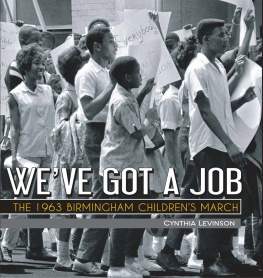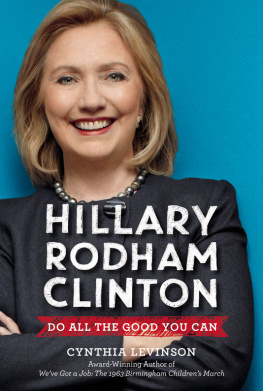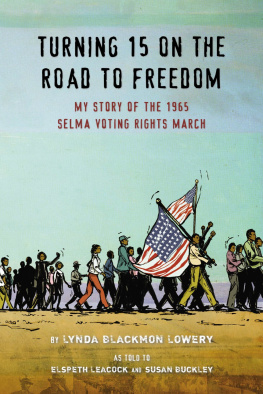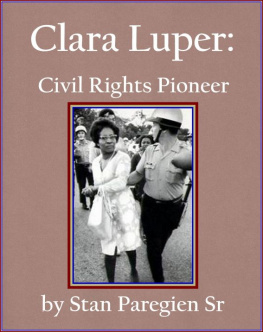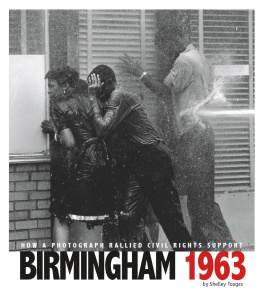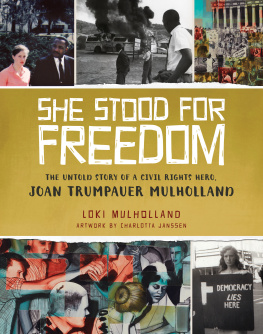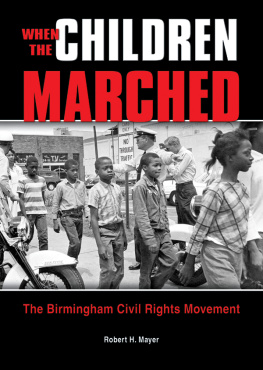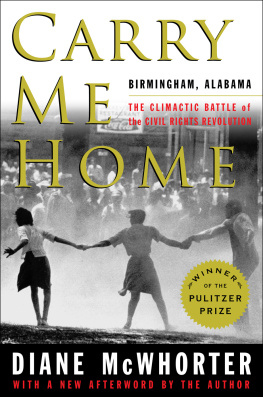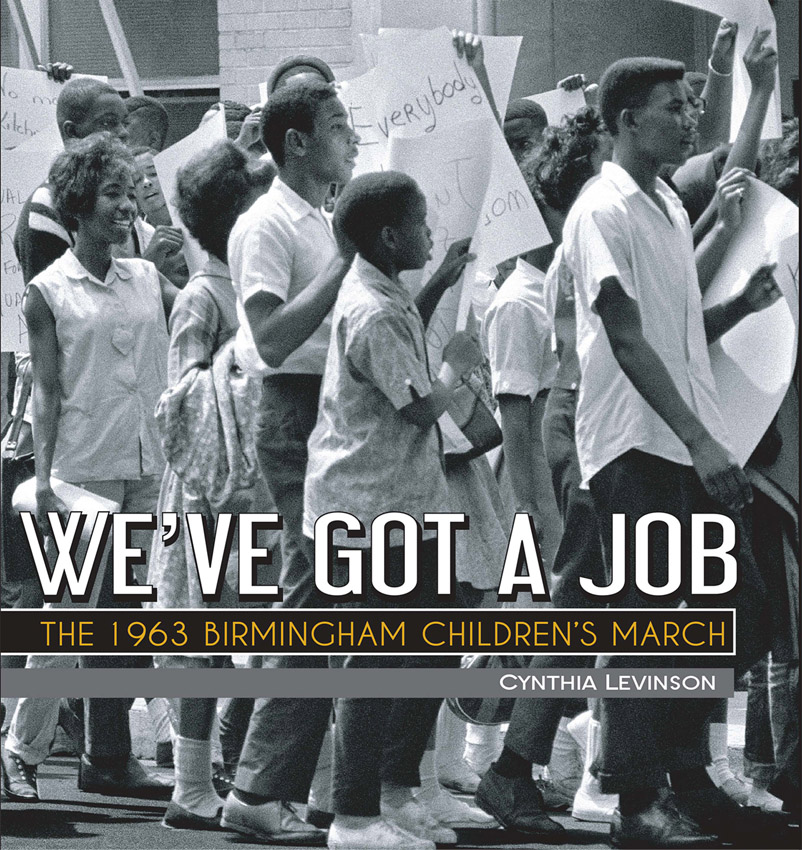CONTENTS
Guide
Published by
PEACHTREE PUBLISHERS
1700 Chattahoochee Avenue
Atlanta, Georgia 30318-2112
www.peachtree-online.com
Text 2012 by Cynthia Levinson
First trade paperback edition published in 2015
All rights reserved. No part of this publication may be reproduced, stored in a retrieval system, or transmitted in any form or by any meanselectronic, mechanical, photocopy, recording, or any otherexcept for brief quotations in printed reviews, without the prior permission of the publisher.
Book design by Maureen Withee
Text and titles set in Century Schoolbook and SF New Republic SC
e-book ISBN: 978-1-68263-118-8
Library of Congress Cataloging-in-Publication Data
Levinson, Cynthia.
Weve got a job : the 1963 Birmingham Childrens March / written by Cynthia Levinson.
p. cm.
1. African AmericansCivil rightsAlabamaBirminghamHistory20th centuryJuvenile literature. 2. Civil rights movementsAlabamaBirminghamHistory20th centuryJuvenile literature. 3. African American studentsAlabamaBirminghamHistory20th centuryJuvenile literature. 4. African American youthAlabamaBirminghamHistory20th centuryJuvenile literature. I. Title.
F334.B69N4476 2012
323.1196'0730761781dc23
2011031738
To my thoroughly splendid
familyRachel, Ariel,
Sarah, Meira, Marc,
Rebecca, Gabriella,
and, especially, Sandy,
my sine qua non.
And to Peace Ponies
everywhere.
C. Y. L.
What happened?
Thats the basic question about history, whether an event took place thousands of years or only minutes ago. And its one of the hardest questions in the world to answer, even when people who saw it happen are still around to tell the story. Sometimes witnesses and participants make it even harder to know!
Thats because three people looking at the same event can see it from three different angles. Over time, as their memories shift and opinions harden, they might relate dramatically different accounts of what happened. This process is nearly inevitable, especially when the participants were frightened at the time of the event, as were most of the four thousand or so young marchers who lived in Birmingham during the civil rights movement.
Occasionally, the recollections that Audrey, Wash, James, Arnetta, and others shared with me differed from the written record. In these cases, I asked more questions, read more books and newspapers, studied more maps and photographs. This work was also necessary because many original records of the events were destroyed. History is facts. History is also stories. In merging participants memories with many other sources, my guidepost was always to tell their stories as truly as possible.
In doing so, I used my judgment but the stories remain theirs not mine.
Why did I choose to tell them? Like Wash, James, and Arnetta (and even more like Charles, Susan, and Pam), I was a teenager in 1963, living in Ohio. Although I read newspaper articles about the marches, hoses, and dogs, it wasnt until I was an adult, writing about music in the civil rights period for Cobblestone magazine, that I learned the heart of the story: all of the protesters assaulted and jailed that May were children.
How could I not have known? I had even taught American history to junior-high and high school students! My ignorance embarrassed me.
Many people, I realized, needed to know how a Childrens March changed American history. So, I set out to learn what happened.
A BBREVIATIONS USED
IN SOURCE NOTES
AH: Audrey Hendricks, personal interview
AH/BCRI: Audrey Hendricks, BCRI oral history transcript
ASG: Arnetta Streeter Gary, personal interview
ASG/BCRI: Arnetta Streeter Gary, BCRI oral history transcript
AW: Abraham Woods, personal interview
BL: Bernard Lafayette, personal interview
BN: Birmingham News
Branch: Taylor Branch, Parting the Waters
BW: Birmingham World
CE: Charles Entrekin, personal interview
CM: Carolyn McKinstrey, personal interview
CM/BCRI: Carolyn McKinstrey, BCRI oral history transcript
CP: Connor Papers, Main Branch, Birmingham Public Library. (Note: Connor Papers refers to the Birmingham Police Department Inter-Office Communication memoranda prepared by police officers who attended mass meetings.)
DM: Diane McWhorter, personal interview
EF/BCRI: Elizabeth Fitts, BCRI oral history transcript
Eskew: Glenn Eskew, But for Birmingham
EW/BCRI: Eileen Walbert, BCRI oral history transcript
Eyes: Eyes on the Prize
Force: A Force More Powerful
GCW: Gwen Cook Webb, personal interview
GSG/BCRI: Gwendolyn Sanders Gamble, BCRI oral history transcript
Harris: W. Edward Harris, Miracle in Birmingham
Hampton: Henry Hampton and Steve Fayer, Voices of Freedom
Holt: Len Holt, Eyewitness
Huntley: Horace Huntley, Foot Soldiers for Democracy
JHF: Jan Hendricks Fuller, personal interview
JS: James Stewart, personal interview
JS/BCRI: James Stewart, BCRI oral history transcript
Kasher: Steven Kasher, The Civil Rights Movement
King: Martin Luther King Jr., Why We Cant Wait
Lest: Lest We Forget, Im On My Way, Volume 2
Levine: Ellen Levine, Freedoms Young Children
LH/BCRI: Lola Hendricks, BCRI oral history transcript
Manis: Andrew Manis, A Fire You Cant Put Out
McWhorter: Diane McWhorter, Carry Me Home
Mighty: Mighty Times: The Childrens March
MLK: Martin Luther King Jr.
Nunnelley: William A. Nunnelley, Bull Connor.
NYT: New York Times
Pacifica: Pacifica Radio Archive
PWM: Pam Walbert Montanaro, personal interview
RBPC: Ruth Barefield-Pendleton Collection (refers to papers available in the box with this name at the BCRI.)
SLS: Susan Levin Schlechter, personal interview
Stanton: Mary Stanton, Freedom Walk
Sznajderman: Michael Sznajderman, A DangerousBusiness
Thornton: J. Mills Thornton, Dividing Lines
Ulrich: Joyce Ulrich, We Were the Heart of the Struggle
Vaught: Seneca Vaught, Narrow Cells and Lost Keys
WB: Washington Booker, personal interview
WB/BCRI: Washington Booker, BCRI oral history transcript
West: Carroll Van West, The Civil Rights Movement in Birmingham, Alabama, 19331979
White: Marjorie White, Walk to Freedom
BCRI refers to the Birmingham Civil Rights Institute. Citations notated BCRI refer to interviews conducted under the auspices of and available through the Institute.
M ANY FINE NONFICTION books, movies, and other sources for young people focus on or include information about Birmingham, Alabama, during the Civil Rights Era.
I recommend the following.
Books
Brimner, Larry Dane. Birmingham Sunday. Honesdale, Pennsylvania: Boyds Mills Press, 2010.
Levine, Ellen. Freedoms Children: Young Civil Rights Activists Tell Their Own Stories. New York: Puffin Books, 1993.
Mayer, Robert H. When the Children Marched: The Birmingham Civil Rights Movement. Berkeley Heights, New Jersey: Enslow Publishers, Inc. 2008.
McWhorter, Diane. A Dream of Freedom: The Civil Rights Movement from 1954 to 1968. New York: Scholastic, Inc., 2004.
Rochelle, Belinda.
Next page
